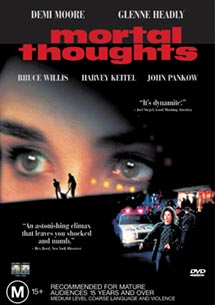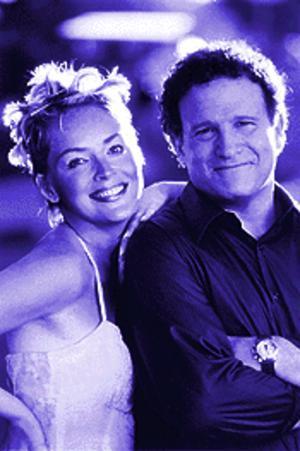This appeared in the Chicago Reader on April 26, 1991. Consider this review Part 2 of a long-term re-evaluation of Alan Rudolph’s use of music and his treatment of working-class people, preceded by my 1979 review of Remember My Name for Film Quarterly. — J.R.

MORTAL THOUGHTS
** (Worth seeing)
Directed by Alan Rudolph
Written by William Reilly and Claude Kerven
With Demi Moore, Glenne Headly, Bruce Willis, Harvey Keitel, John Pankow, and Billie Neal.
For all his talent and sophistication, Alan Rudolph has frequently shown a romantic slant toward the working class that borders on stylistic gentrification. Even in my two Rudolph favorites, Remember My Name (1978) and Choose Me (1984), the ironic casting of a construction worker and his wife with real-life mod couple Anthony Perkins and Berry Berenson and the creation of a dream-bubble ambience in a gritty bar suggest a kind of put-on.
Life is a dream, Rudolph always appears to be saying, and the more sordid and low-down the life is, the more seductive and precious the dream becomes. It’s a viable enough premise for a mannerist, and he invariably makes the most of this conceit; yet there are times when his taste for cardboard funk causes his worlds to totter like houses of cards. Read more
This appeared in the August 27, 1999 issue of the Chicago Reader. –J.R.

The Muse
Rating ** Worth seeing
Directed by Albert Brooks
Written by Brooks and Monica Johnson
With Brooks, Sharon Stone, Andie MacDowell, Jeff Bridges, Mark Feuerstein, Stacey Travis, and Steven Wright.
By Jonathan Rosenbaum
The Muse made me laugh, but not as much as the five Albert Brooks movies preceding it. It also made me think less, and that’s more of a problem. I don’t care whether Mel Brooks makes me think, but Albert’s a different matter. He’s a conceptual filmmaker unlike any other — a Stanley Kubrick among comedians whose premises need to be pondered, not simply accepted or rejected.
The Muse is a somewhat flimsy high-concept movie whose ultimate justification is that its subject is the manufacture of flimsy high-concept movies. It isn’t so much about a muse as about the apparent need for one. Steven Phillips (Brooks) is a well-to-do Hollywood screenwriter with a wife (Andie MacDowell) and two daughters — the first Brooks hero to have children — who’s desperate because everyone tells him he’s “lost his edge.” What does that mean? The movie doesn’t say, and Brooks, as usual, doesn’t spell it out. Read more
The following appeared in the Chicago Reader on January 16, 2004. Over five years later, I developed some elements in this piece while writing a much longer account of Thompson’s work including an email exchange with him which appeared in the Fall 2009 issue of Film Quarterly. (See “A Handful of World”.)
I was more than gratified when Thompson told me, years later, that this review led him to go back on his decision to retire from filmmaking and make another film, which yielded Lowlands, a few years before his untimely death. — J.R.

Universal Hotel
**** (Masterpiece)
Directed and written by Peter Thompson.
El movimiento
*** (A must-see)
Directed by Peter Thompson
Written by William F. Hanks and Thompson.

Peter Thompson, who teaches photography at Columbia College and makes personal, autobiographical documentaries, is a major, neglected filmmaker. He’s made five films, and the latest, El Movimiento, his only feature, is having its world premiere at the Gene Siskel Film Center on January 16 and will be shown there again on January 19 — both times with the 1986 Universal Hotel, my favorite of Thompson’s shorts. (Thompson will lead a discussion at the Friday screening.)
Philosophically and aesthetically, Thompson’s films are as beautiful and provocative as any contemporary American independent work that comes to mind. Read more




